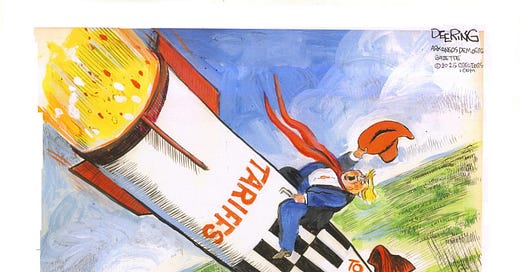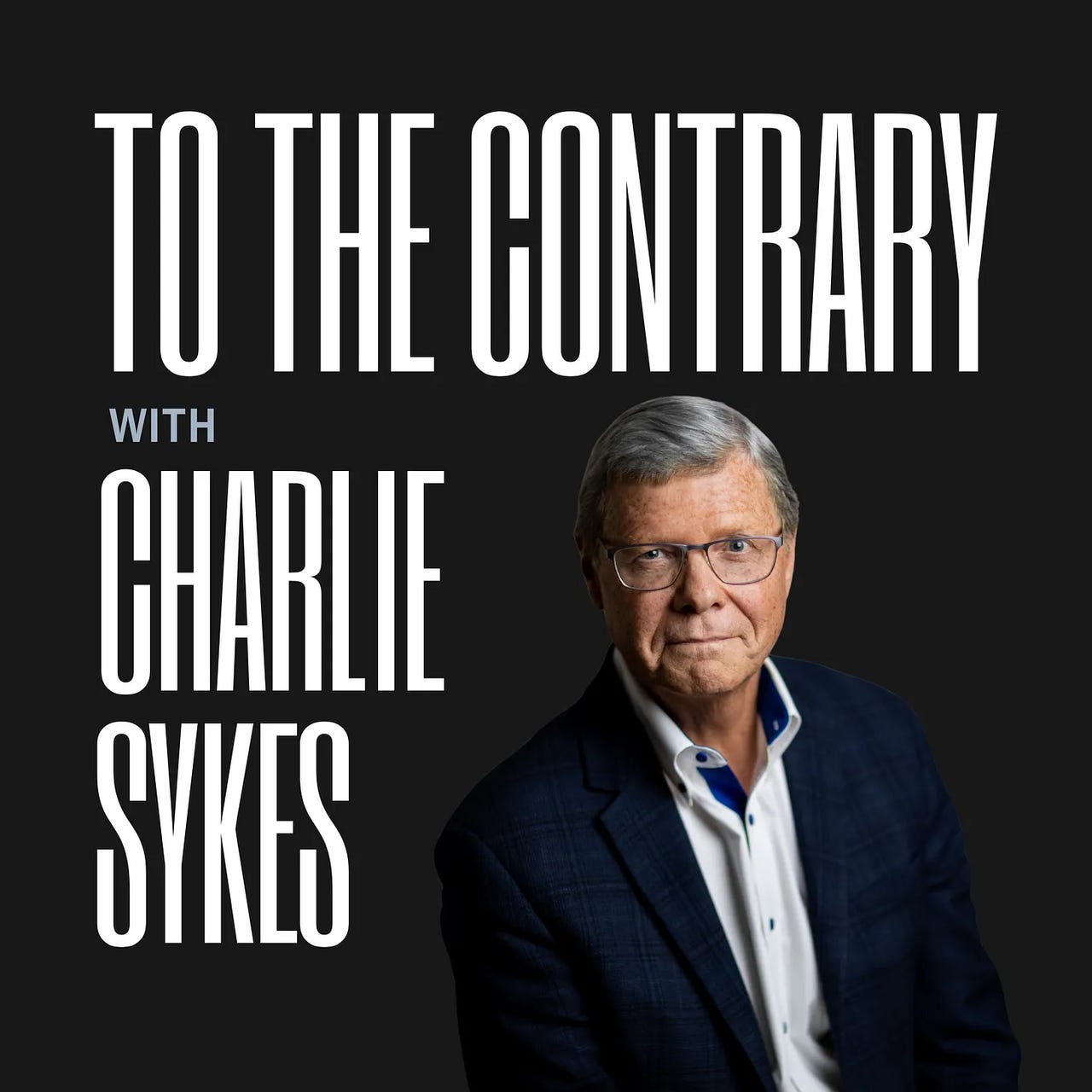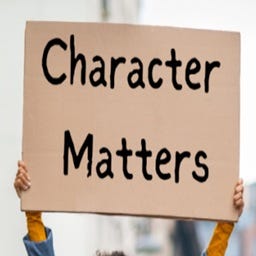“As we learned after President Herbert Hoover signed the Smoot-Hawley tariff at the outset of the Great Depression, vibrant international trade is a key component to economic recovery; hindering trade is a recipe for disaster.” ~Asa Hutchinson
Welcome another week of Trumponomics… I could comment on the week, but you might find my language offensive, so I’ll let others do my talking. These articles from throughout the week are far more dignified than what I am thinking about this moronic and despotic administration. However, one can’t help but wonder… whether the on and off again tariffs were by design. Trump only simulates madness - the rest of us pay the price?
Trump’s Encouragement of Stock Investors Draws Scrutiny. Was he The Ultimate Insider? Did you notice that Marjorie Taylor Greene Snapped Up Stocks as Trump Tariffs Tanked Markets.
Thought for the day in honor of his birthday…
“The arts of power and its minions are the same in all countries and in all ages. It marks its victim; denounces it; and excites the public odium and the public hatred, to conceal its own abuses and encroachments.”
~ Henry Clay
What I’m reading today…
“We're going to get more inflation. There may be a lot of short-term pain. They're incorrectly saying that this is the road to long-term gain. But I've never seen a president willing to undertake this amount of pain on the basis of a theory. It's just a shame that it's on the basis of such a misguided theory.”
~Jason Furman, Department of Economics, Harvard University
He just likes tariffs and always has, and everything else you read and hear about them is just reverse-engineered pabulum to fit (or hide) that singular motivation. Trump’s views on immigration, health care, taxes, foreign interventionism, and many other things have changed since the 1980s, but his views on trade have never wavered: It’s a zero-sum game; trade balances tell you who’s winning and losing (surplus good, deficit bad); foreign governments are cheating to win; and tariffs—beautiful tariffs!—can turn the tide in America’s favor, boosting jobs, exports, and growth along the way. He said as much in that newspaper ad; he said it again three years later in a long interview with (lol) Playboy magazine; and he’s said it—in public and private—dozens of times since then, especially during his first term as president. Trump even went so far, Bob Woodward documented in his book, as to famously scribble “TRADE IS BAD” in the margins of a draft presidential speech…
Why Trump thinks this way is anyone’s guess. Last week, the Wall Street Journal quoted former Trump officials as tying it all back to his years in Manhattan real estate, where deals were done in cutthroat, zero-sum terms and Japanese investment was a threat… According to Marc Short, chief of staff for former Vice President Mike Pence, “The way [Trump] would describe it is to say … the American marketplace is the greatest marketplace, and people should be charged to have access to it, like a real-estate fee. And we’re suckers not to be charging people not to have access to it.” … Short recalls that Trump’s economic advisers often tried to dissuade him of his trade “misconceptions,” such as who pays tariffs (spoiler: we do), but Trump would simply refuse to believe it.
How Trump’s Tariffs Fit the Autocrat’s Playbook
The story about tariffs also comes with a larger cultural narrative, especially in the last few days, which is about the glorification of manufacturing and “real men” who are in factories and produce things, tangible things. That has always been part of the Trumpist package of maybe not ideas in the sense of grand philosophies but certainly cultural ideas. And one sees some parallels here again with Orbán, who has a clear emphasis on saying, Let’s move away from supposedly too much university education, let’s have more apprenticeships, let’s send more people into factories, especially German car manufacturers. That’s really producing something.
And, in a very roundabout way, it might relate back to something called producerism, which historians mention when they talk about populism in the original, American sense, from the late nineteenth century. This is in contrast with finance. Producerism is about tangible things that somebody actually created with their own hands. One can see certain cultural frames that might be deployed here. Orbán had a conscious policy of de-educating his own country by saying, you know, Let’s no longer fulfill the promise of ever more people going to college. Let’s actually have fewer people going, because that’s going to mean less political trouble, less opposition, less discontent.
The Economist Slams ‘The Madness of King Donald’ With Scathing Takedown of Tariffs
On the same day that Trump flew to Florida for some R&R after his tariff policy caused the U.S. economy to tank, the publication heralded the moment as “America’s total abandonment of the world trading order and embrace of protectionism.” The administration’s “catalogue of foolishness” will hurt American consumers, reduce competition, and damage global trade, they argued, while taking swipes at Trump’s “pathetic” grasp of technicalities and lack of knowledge on the history of tariffs and their applications. The piece concludes that while Trump’s policies are reckless and based on “deluded” economic theories, the world can limit the fallout by pursuing deeper integration amongst themselves and cutting the U.S out of the picture—although they admit this will take time.“ There is no avoiding the havoc Mr Trump has wrought, but that does not mean his foolishness is destined to triumph,” the magazine concluded.
The world's hot new trade is "sell America"
President Trump's whiplash tariffs may have inadvertently achieved his goal of reordering the global economy by inspiring investors to sell U.S. assets and move their money elsewhere. For decades, the world has invested in America. Now, a global moment of clarity threatens to redirect trillions of dollars of capital inflows and diminish the U.S. in the international economic order. The U.S. receives nearly $2 trillion each year in foreign capital inflows, according to government data — things like investments in businesses and bank lending, but also foreign investors buying U.S. stocks and bonds. America's share of global capital flows has nearly doubled from where it was just before the pandemic, to 41%. Then came the tariffs. The U.S. dollar — which should strengthen in a tariff environment, all other things being equal — weakened steadily.
"This suggests foreigners have been and are continuing to sell U.S. stocks and sending their money elsewhere," write Howard Ward and John Belton, co-chief investment officers of value at Gabelli Funds. Why the mighty bond market spooked Trump.
What’s So Screwy About the Trump Tariffs
Tariffs are advertised by their supporters as taxes on things Americans consume. When he was a candidate for vice president, J. D. Vance mocked those who worried about the price of toasters. But a tariff is also a tax on things Americans produce. At every stage of the industrial process, American companies will pay more for the components they need. And so it will be for the makers of those components, and the makers of the components’ components, and so on, in an infinite regression of self-defeat.
“You don’t have to pay the tariff if you make your car in the United States,” insist the Trumpists. No? What about the steel that goes into the car? The glass for the windscreen? The fabric for the car’s upholstery? The speakers for the car’s sound system? Tariffed, tariffed, tariffed—to the point where the car itself costs far more for a worse product than what is available in all of the world’s other markets.
Inside the Oval: 3 reasons Trump buckled on tariffs
President Trump's boosters hailed his decision to pause tariff increases for countries around the world as a strategic masterstroke. But few are buying the spin. Trump buckled under tremendous, mounting-by-the-minute pressure from CEOs ... friends ... GOP senators ... the markets ... and bond prices. Trump himself admits he blinked when "people were getting a little queasy" about the bond market.
Trump’s insistence on doubling down on disastrous consumer taxes (tariffs)—even suggesting a new 50 percent tariff on China—is a strong indication that, true to form, he will refuse to concede error. Instead, he will persist in wrecking the international global trading system and nuking trillions in wealth. Equal parts economically illiterate and defiant toddler, he would rather see the U.S. economy and his presidency go up in smoke than reverse course.
So far, most Senate Republicans appear to be utterly indifferent to the pain their party is causing. Sen. Ron Johnson (R-Wis.) told PBS News Hour host Amna Nawaz last week: “Well, obviously a 5 percent decrease in the markets would heighten my concern. I would assume that got the president and his advisers’ attention as well.” If only he had a position of authority to do something about this. He sounds less like an elected official and more like an ivory tower academic pondering the amount of distress that can be inflicted before we slide into a full-blown recession. “I think everybody’s kind of bracing to see what the fallout is and really how painful this experience is going to be,” he intoned. Is that how this works, Senator?
It’s Time for Republicans to Listen to the Markets, Not Trump
“Markets can remain irrational longer than you can remain solvent.” - John Maynard Keynes
“Like a great many people, I hoped that Trump would listen to the markets more attentively than he does to the retinue of sycophants he surrounds himself with. Tragically, that has not happened.”
…that Trump has a mandate—is also ridiculous but has some superficial political merit. Trump was honest and open about his love of tariffs—the “most beautiful word in the world” in his telling—and he got elected. And unlike his first term, there is nobody in his entourage or the Republican Party that can talk him out of the idea that he has a mandate to do whatever he wants.
Republicans are going public with their growing worries about Trump’s tariffs
Manufacturers struggling to make long-term plans. Farmers facing retaliation from Chinese buyers. U.S. households burdened with higher prices.
Republican senators are confronting the Trump administration with those worries and many more as they fret about the economic impact of the president’s sweeping tariff strategy that went into effect Wednesday.
In a Senate hearing and interviews with reporters this week, Republican skepticism of President Donald Trump’s policies ran unusually high. While GOP lawmakers made sure to direct their concern at Trump’s aides and advisers — particularly U.S. Trade Representative Jamieson Greer, who appeared before the Senate Finance Committee Tuesday — it still amounted to a rare Republican break from a president they have otherwise championed.
GOP lawmakers like NC Sen. Thom Tillis concerned, 'skeptical' about Trump tariffs
Sen. Thom Tillis, R-N.C., expressed deep skepticism of the policy to Greer at Tuesday's hearing, saying, “Whose throat do I get to choke if this proves to be wrong?” Tillis, one of the most vulnerable Republican senators up for reelection in 2026, suggested to Greer that the administration has until February next year to fix the economy before voters will punish Republicans at the ballot box. “I wish you well,” he said, adding he is “skeptical.”
Ted Cruz Begs Trump to Stop Listening to His Tariff-Loving Aides
Sen. Ted Cruz has begged President Donald Trump to stop listening to the tariff hawks in his administration and “take the deal” countries are offering to lower trade barriers. But administration officials haven’t been able to keep their stories straight on whether the tariffs are a short-term tactic to bring countries to the negotiating table or a long-term strategy to create manufacturing jobs in the U.S.
Joe Rogan, Dave Portnoy and Ben Shapiro are among Trump backers now questioning tariffs
Barstool Sports owner Dave Portnoy, hedge fund manager Bill Ackman and even Elon Musk are adding their voices to a number of congressional Republicans who have weighed in against the tariffs.. Here’s a look at some of what they’ve said:
“I think that the way that the tariff plan was rolled out is about as bad a rollout as you could do…The idea that this is inherently good and makes the American economy strong is wrongheaded. It’s untrue. The idea that it is going to result in massive re-shoring of manufacturing is also untrue.” ~ Ben Shapiro
Rogan, one of the nation’s most influential podcasters who endorsed Trump on the eve of last year’s election, said in March that Trump’s feud with Canada was “stupid” and bemoaned the fact that Canadians “booed us over tariffs” during professional sporting events featuring teams from both countries.
Rogan has recently broken with Trump in other areas, including over wide-ranging deportations, referring to a recent operation to detain immigrants as “horrific.”
The pro-Trump hedge fund manager, Bill Ackman, warned that “we are heading for a self-induced, economic nuclear winter” unless Trump took a more deliberate approach, likening the full tariff activation “economic nuclear war.” … “I am just frustrated watching what I believe to be a major policy error occur after our country and the president have been making huge economic progress that is now at risk due to the tariffs.”
I Watch the Markets for a Living. This Week, Everything Changed.
In the 50 years I have been immersed in markets and economic policy, I have never before witnessed a signature economic policy initiative that was met with such unalloyed criticism. What’s worse, the damage was entirely self-inflicted.
“The late columnist Charles Krauthammer once asserted that ‘decline is a choice,’ not an inevitable outcome dictated by external forces. But rather than resisting decline, the Trump-led American right seems intent on embracing it, abandoning the United States’ role as a global leader, dismantling the free-market system, and encroaching upon the rule of law. At this critical juncture… the Trump administration’s “America First” doctrine and its overzealous reliance on executive power that are, together, making the United States less secure, less wealthy, and less free.
~ The Dispatch
Industry leaders told me they anticipated the tariffs and were already adapting. The larger companies—like Hasbro, which sells Monopoly and many other name-brand games—had already moved much of their production out of China and into nearby countries like Vietnam, which they thought Trump was less likely to target.
They didn’t plan for Trump going after those nations as well, and they certainly didn’t count on the president calling for tariff spikes well beyond the 10 or 20 percent most analysts thought he had in mind.
Now Trump’s Tariffs Are Coming For Your Medicine
Though pharmaceuticals were spared from sweeping new tariffs unveiled by Trump in a “Liberation Day” ceremony last week, the president has long expressed interest in putting levies on medicines.
Will the tariffs lead to a recession? Here’s how to know if we’re in one
Are there any signs a recession is imminent?
Not yet. But one development that has sparked widespread fear is a real-time economy tracker maintained by the Federal Reserve’s Atlanta branch. It now indicates that the economy could shrink by 0.8% at an annual rate in the first three months of this year, down from 2.4% in last year’s final quarter.
Typically, a recession occurs when some short of shock hits the economy, such as the pandemic in 2020, or the bursting of the housing bubble in 2007. It’s not yet clear that tariffs will have a large enough impact to knock the economy into reverse.
How to Prepare for a Recession
The U.S. economic outlook is bleak—but just how bad is it going to get? In the three trading days since President Donald Trump announced his “Liberation Day” tariff regime, the S&P 500 fell 11 percent and J.P. Morgan put the odds of a U.S. and global recession at 60 percent, while Goldman Sachs raised its odds to 45 percent this week. (The only reason the numbers aren’t higher is these banks aren’t sure whether to believe Trump—if he really follows through on his 185-front trade war, they argue, the chance of a recession will become significantly higher.)
What can Americans do now if a recession is truly around the corner? Build up a buffer.
“There’s a paradox…If everyone tries to save at the same time, that’s obviously one of the ways that a recession can happen… A recession can be a self-fulfilling prophecy.”
How Trump’s Tariffs Play Right Into China’s Hands
China already controls one-third of all global manufacturing (up from 6 percent in 2000), and whether you are talking about cars or robots or phones, what is coming out of China today is not just cheaper and faster. It is cheaper, faster, better and smarter — and it is all about to be dramatically supercharged by China’s headlong rush to put artificial intelligence into everything it makes.
This engine is the product of decades of massive government investments in education, infrastructure and research, behind walls of protection — in a society where people are ready to work from 9 a.m. to 9 p.m., six days a week. While China was building that, America’s biggest new industry was political polarization and getting its children addicted to TikTok and Instagram.
I Invented a Popular Kitchen Gadget. Tariffs Will Kill My Business.
The new tariffs on imports from China and Taiwan (and the threat of additional Chinese tariffs) are a kick in the teeth for my small family-run business, compelling me to raise my prices even as my profits are slashed. The government’s promise to reshore the production of simple items like mine looks, from where I sit, like something of a fever dream…
So here’s how my business pencils out after last week’s tariff sucker punch. The cost to manufacture my product in China and ship it to America has gone from my average landed cost (total product price, plus overseas freight plus total import costs) of about $5 to about $7.50. To stay within the healthy ratio I cited requires raising the average selling price by at least $5, to $30 from $25. A 20 percent price increase is one that threatens to sling this product from the realm of “a little expensive but worth it” to the land of “are you nuts?” The danger seems particularly acute as prices for basic goods, such as food and clothing, rise and chew into consumers’ discretionary budgets.
Trump Insists ‘I Know What the Hell I’m Doing’ as His Tariffs Unleash Carnage
President Donald Trump insisted he knows what he’s doing with his “Liberation Day” tariffs even as markets plummeted and comparatively safe assets like Treasury bonds cratered….
“The U.S. escalation of tariffs on China is a mistake upon mistake, severely infringing upon China’s legitimate rights and interests, and seriously damaging the multilateral trading system based on rules,” China’s State Council Tariff Commission said in a statement unveiling its retaliation.
U.S. Treasuries, which are largely considered the world’s safest asset, suffered a vicious selloff Wednesday that temporarily drove the 10-year yield up to 4.51 percent and the 30-year yield above 5 percent.
Quote of the day…
“The world as we knew it has gone. Nobody wins from a trade war.”
~Keir Starmer, Prime Minister of Great Britain
What I am watching…
Trump permanently—or at least for a generation—stained the good name of the United States with dozens of allies around the world, countries that had done things the United States asked, countries that had signed agreements with the United States. He demonstrated that America’s word was not good, that American credit could not be trusted. Many corporations have very intricate systems of supply with providers all over the planet. And those things were interrupted, and those business relationships were disrupted in ways, again, very hard to undo.
What I am listening to…
“This isn’t just a rushed policy… it’s a careless one…”
“A lot of what the US exports is services…”








